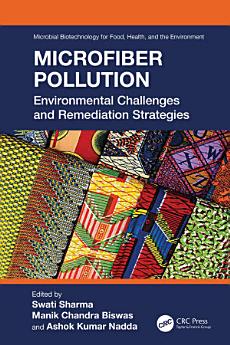Microfiber Pollution: Environmental Challenges and Remediation Strategies
Giới thiệu về sách điện tử này
- Provides an in-depth examination of global microfiber sources, detailing their distribution in air, water, and soil, and highlighting the environmental and aquatic impacts.
- Explores advanced methods for detecting and characterizing microfibers, enhancing understanding of how these pollutants propagate into oceans and affect marine habitats.
- Discusses the potential threats of microfibers to aquatic species, human health, and the food chain.
- Reviews current remediation technologies and sustainability trends in the textile industry, offering insights into future challenges and motivating both consumers and industries to adopt eco-friendly practices.
Giới thiệu tác giả
Swati Sharma is working as an assistant professor in the University Institute of Biotechnology, Chandigarh University, Mohali, Punjab India. Dr. Sharma has completed her PhD from the University Malaysia Pahang, Malaysia. She worked as a visiting researcher in the College of Life and Environmental Sciences at Konkuk University, Seoul, South Korea. Dr. Sharma has completed her master’s (M.Sc.) from Dr. Yashwant Singh Parmar University of Horticulture and Forestry, Nauni Solan H.P., India. She has also worked as program co-coordinator at Himalayan Action Research Center Dehradun and senior research fellow at India Agricultural Research Institute. Presently, Dr. Sharma’s research is in the field of biopolymers, waste management, bioplastics, hydrogels, keratin, nanofibers, sponges, beads and nanoparticles, and polymers with antioxidant and anti-cancerous activities. Dr. Swati has published more than 35 research papers in various internationally reputed journals, 15 books, and a couple of book chapters.
Manik C. Biswas is a polymer and materials engineering expert with 10+ years of research and industrial experience seeking to innovate real-world textile and polymeric products in a multidisciplinary way yet individually, with expertise in polymer chemistry, fiber spinning techniques, wet processing techniques, nanomaterials synthesis, surface modification via functionalisation, and grafting and polymer reinforcement. Dr. Biswas utilises his unique knowledge of applied chemistry, chemical engineering, polymers, and fibers to guide innovations in green chemistry as well as their adoption by industry and government. He finished his PhD in fiber and polymer science from Wilson College of Textiles, North Carolina State University, USA, and is working as a materials engineer in the packaging industry focusing on materials solutions and sustainability. Dr. Biswas also finished his master’s in materials science and engineering from Tuskegee University, Alabama, USA. He also another master’s degree in applied chemistry and chemical engineering from University of Dhaka, Bangladesh, where he finished his B.Sc. Dr. Biswas has filed a U.S. patent and has published 25 research articles in various internationally esteemed journals and more than 6 book chapters.
Ashok Kumar Nadda is working as an assistant professor in the Department of Biotechnology and Bioinformatics, Jaypee University of Information Technology, Waknaghat, Solan, Himachal Pradesh, India. He has completed his Ph.D. in Biotechnology from Department of Biotechnology, Himachal Pradesh University, Summer Hill, Shimla, India. He worked as a post-doctoral fellow in State Key Laboratory of Agricultural Microbiology, Huazhong Agricultural University, Wuhan, China. He also worked as a brain pool researcher/assistant professor at Konkuk University, Seoul, South Korea. Dr. Ashok has a keen interest in carbon utilisation, enzyme immobilisation, biomaterials, biopolymers, nanobiotechnology, biocatalysis, waste management, biomass degradation, biofuel synthesis, and biotransformations. Dr. Ashok has published more than 150 research papers in various internationally reputed journals, 34 books, and 57 book chapters and holds a couple of patents.






